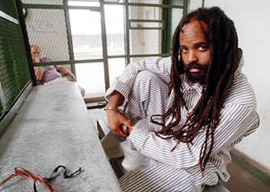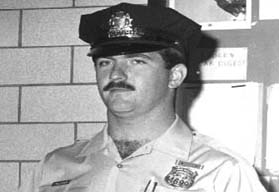
December 12, 2011

Mumia Abu-Jamal
 Daniel FaulknerTHE PROSECUTION’S THEORY
Daniel FaulknerTHE PROSECUTION’S THEORY
While Mumia Abu-Jamal sat in his cab in a parking lot near the intersection of 13th & Locust, officer Daniel Faulkner made a routine traffic stop of Abu-Jamal’s brother William Cook for going the wrong way down Locust, a one-way street. Cook assaulted Faulkner first—a crime Cook never disputed and to which he actually pled guilty in 1982. Faulkner retaliated by bashing Cook with his flashlight. Hearing the scuffle, Abu-Jamal exited his cab, ran across the street, and shot Faulkner in the back. Faulkner returned fire as he fell to the ground, striking Abu-Jamal in the abdomen. Abu-Jamal then stood over Faulkner and planted a bullet in his brain, killing him instantly. When additional police arrived within one or two minutes after the shooting, Abu-Jamal was sitting wounded on the curb. Within his reach sat a .38 revolver that no one contests was legally registered to him. It had been removed from the shoulder holster he was wearing. Inside its chamber were five spent cartridges. When police tried apprehending him, Abu-Jamal reached for the gun, only to be kicked in the throat and subdued.
The problem: As damning as all that is, the police and prosecutors bungled numerous items. They never ran ballistics tests on the gun nor on Abu-Jamal’s hands to detect traces of gunpowder. Eyewitnesses, mostly consisting of the sort of needle-marked urchins you’d expect to be slithering around downtown Philly at 4AM, wildly contradicted one another and themselves with their statements. And regarding Mumia’s famous alleged hospital-bed confession—“I shot the motherfucker, and I hope the motherfucker dies”—the very fact that it took nine weeks for two police officers to come forward and say they suddenly “remembered” it makes their claims highly suspect. So it’s not as if the prosecution’s theory was necessarily flawed, it’s that the police fumbled the ball enough times to create reasonable doubt.
THE DEFENSE’S THEORY
Mumia Abu-Jamal is a man of peace who did not shoot Daniel Faulkner and was instead framed by a famously racist, corrupt, and violent Philadelphia Police Department. He was framed because in his writings and his work as a local radio reporter, he spoke against oppression and racism. He was targeted due to his years of political activism, which included membership in the Black Panthers and a close affiliation with the notoriously skeevy MOVE organization. It was unfair of the prosecutor to note during trial that Mumia had once approvingly quoted Mao about how “political power grows out of the barrel of a gun,” just as it was a low blow for reporters to point out that in 1970 he’d written, “I for one feel like putting down my pen. Let’s write epitaphs for Pigs!”
The problem: The idea that he was framed because of his beliefs is demolished by one simple uncontested fact—he was arrested at the crime scene less than five minutes after the shooting, and thus the arresting officers had no clue of his identity when they cuffed him. He was arrested because he was sitting next to a warm gun a few feet away from a murder victim. The fact that he was a vocal critic of the police may have later intensified the vigor of his prosecution, but it had zero bearing on his initial arrest.
MUMIA’S BROTHER’S THEORY
“I didn’t have nothing to do with this,” blurted out Mumia’s brother, William Cook, when police arrived at the murder scene. But apart from pleading guilty to sucker-punching Faulkner, Cook kept silent for nearly twenty years about the case until he finally claimed that a passenger in his car that morning, William Freeman, had been the shooter.
The problem: By the time Cook finally made this claim—nearly two decades after the murder—Freeman was conveniently deceased. And it strains belief to think that two blood brothers could have kept quiet for twenty years about someone else’s guilt while one of the brothers was facing a lethal injection for a crime both brothers knew he didn’t commit.
MY THEORY
I grew up about ten miles from where Mumia did, and I spent the first quarter-century of my life in the Filthadelphia area. As someone who has been to all 50 states and lived in all four corners of this country, I submit to the jury that the City of Brotherly Love has both the angriest cops and the angriest black radicals in the USA. I wouldn’t trust either group as far as I could sneeze. So I approached this case highly suspicious of both sides.
Like Mumia, I drove a cab in Philly and know every square inch of that magnificently ugly town. When I heard the murder happened at 13th & Locust, I was able to visualize that precise corner, along with the parking lot where Mumia had been sitting in his cab.
After surveying all the evidence, the question came to me like lightning: “Wait a minute—his brother?” Isn’t it extravagantly curious that in the middle of the night and far away from their homes, this rabidly vocal anti-cop activist accidentally happened to witness his own brother being victimized by police brutality on a public street in a huge city directly across from where he was parked? Why, that almost sounds staged.
No one contests the fact that Mumia Abu-Jamal and his brother wound up on the same block of a 135-square-mile city at 4 in the morning. To my knowledge, neither Abu-Jamal nor his brother have ever stated that they had planned to meet up—yet somehow, they both found themselves there by happenstance. Given the city’s size and the time of day, such a coincidence seems almost mathematically impossible to me.
To me, the evidence suggests the murder was an orchestrated ambush. Abu-Jamal and his brother may have conspired to lure a policeman into making a routine traffic stop by purposely going the wrong way down a one-way street. Then, with the policeman distracted, Mumia would walk up from behind and blow out the racist pig’s brains.
Mumia and his brother know who did it—just as, for a split second, Daniel Faulkner knew.
“They don’t just want my death, they want my silence,” Mumia once wrote, sidestepping the thorny fact that he’s done countless interviews and has published several books and hundreds of articles while the imaginary gulag was supposedly muting him.
You have it all wrong, Mumia. Your silence is the problem. After thirty years and millions of words, you haven’t made a peep about who killed the cop that was magically murdered right before your eyes.